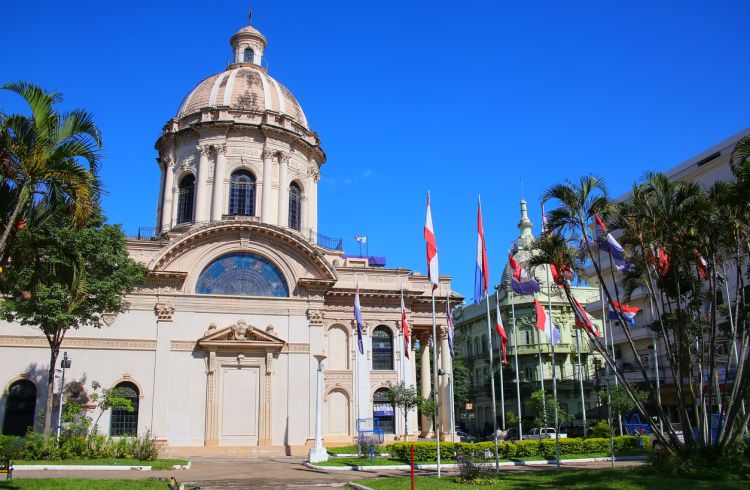Crime and Politics in Paraguay: Travel Tips to Stay Safe
Paraguay has a long history of political turmoil and its share of crime. Find out how to stay safe from petty criminals and protests with these tips.
 Photo © iStock/Donyanedomam
Photo © iStock/Donyanedomam
Petty and violent crime in Paraguay
Overall, Paraguay is a safe country and its major cities are safer than others of the same size in South America. Taking precautions and using some common sense will generally keep most travelers out of trouble. Paraguayans are generally conservative people, so it is best to dress and behave appropriately to avoid offense.
Although most crime is generally non-violent, in major urban centres violent crime is gradually on the increase especially in touristy areas in Asunción, Ciudad del Este and Pedro Juan Caballero.
If faced with an armed assailant, it's best not to resist. Snatch and grabs by thieves on motorcycles do occur and sometimes victims will be threatened with a weapon.
Street crime such as pickpocketing, bag snatching, jewellery theft and mugging is prevalent in the cities. Car theft, armed robbery and home invasions can be problems in both urban and rural centres.
There are things you can do to minimise the chances of becoming the next opportunity for thieves:
- Don't wear expensive jewelry or carry large amounts of cash
- Avoid flashing mobile phones and wallets when out walking or riding public transport. Recent incidents of pick-pocketing, bag-snatching and jewellery theft occurred on buses
- Take care when withdrawing money from ATM's. Try to use one inside a bank if possible and avoid withdrawing money at night
- If you need to change money, use only the foreign exchange inside a bank or authorised exchange outlets. Anyone who offers you an amazing exchange rate is likely to scam you
- It's best to avoid walking at night in downtown Asunción and Ciudad del Este, so traveling by taxi is a safer alternative
- Incidents of theft from checked baggage at both airports and bus terminals have been reported. Ensure you have comprehensive travel insurance and keeping an eye on your belongings where possible.
If you unfortunately become a victim of crime, you can report it to the tourist police located in Asunción, Ciudad del Este, Encarnación and Salto del Guaira.
Always carry photo ID with you while traveling in Paraguay.
Drugs are illegal in Paraguay. Get caught using, possessing or trafficking them and you can guarantee the penalties will be severe such as heavy fines and imprisonment
It's also forbidden to photograph government buildings, airports, police stations or military facilities.
In border areas such the department of Amambay, drug trafficking and its associated violence are a major concern to local authorities. Here, the region of Canindeyu and also the border with Argentina and Brazil; illegal cross-border activities are common, violent and often involve the use of firearms.
Due to this serious situation, there is an increased military and police presence in these areas.
The activities of such groups are rarely focused on foreigners. But, intending travellers should exercise extreme caution.
Scams in Paraguay
Unauthorized ticket vendors operating in the Asuncion bus terminal, badger travellers into buying tickets for substandard or non-existent bus services. This situation is avoided by ensuring one only purchases tickets from and accredited ticket booth.
There are card game scams where the scammer will make it seem like it is lucrative, with participants "winning" money. However, the scammer's buddies (the participants) are in on it, so your chances of winning are next to none.
Prostitution is legal in Paraguay and it's prominent in downtown Asunción. It's best to avoid it or you may go home with more than some locally made souvenirs.
Paraguay's political climate
The present judicial system and all public institutions were shaped by several decades of military dictatorship, and fascist, neo- Nazi ideology. As a consequence, institutional corruption is pervasive.
The Constitution of 1992 affords citizens the rights of freedom of the press, speech and religion. Charges must be brought against anyone accused of a crime within 180 days or be dropped altogether. All suspects now have the right to a lawyer. However, prison conditions are abysmal.
Asuncion's largest prison holds three times the population for which it was designed with only 120 guards overseeing more than 2,500 prisoners most of whom are malnourished and kept in unsafe and unsanitary conditions. Sounds like a place you want to avoid visiting unless you plan to end up in an episode of Banged Up Abroad.
Extremist groups exist in Paraguay. Some of the groups operating in Ciudad del Este and along the tri-border region between Paraguay, Brazil and Argentina, are thought to have links with terrorist groups in the Middle East.
In the northern department of San Pedro and the southern department of Concepcion, a small armed group, the Ejercito del Pueblo Paraguayo (EPP) is active. Its origins date back to 1992, when a group of trainee priests - recently expelled from a Catholic seminary for their radical political views - established the Movimiento Monse or Romero, with the aim of effecting a socialist revolution. The group has stated that "radical and revolutionary changes [are] the only way to dignify the suffering and hunger of our poor people".
Kidnappings have occurred in the region so be alert at all times if you are traveling there.
Occasionally, political protests will break out and it's best to try and avoid them if possible. Listen for news and information via the media and local authorities. If you come to a road block, it's probably a good idea not to cross it.
Simple and flexible travel insurance
You can buy at home or while traveling, and claim online from anywhere in the world. With 150+ adventure activities covered and 24/7 emergency assistance.
Get a quote
No Comments